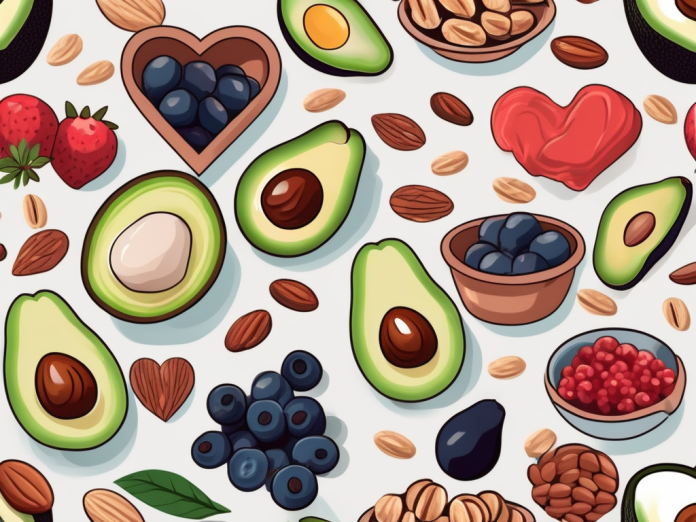In today’s health-conscious world, keeping our cholesterol levels in check has become more important than ever. High cholesterol can lead to various health risks, including heart disease and stroke. Fortunately, there are many dietary changes you can make to effectively lower your cholesterol levels. By incorporating certain foods into your daily meals, you can take control of your cholesterol and improve your overall health.
Understanding Cholesterol and Its Impact on Health
Before we dive into the foods that can help lower cholesterol, let’s take a moment to understand what cholesterol is and how it affects our health. Cholesterol is a waxy substance that your body needs to build cells and produce hormones. However, too much cholesterol can lead to a buildup in your arteries, restricting blood flow and potentially causing heart problems.
The Role of Cholesterol in the Body
Cholesterol plays a vital role in maintaining the body’s overall health. It helps with the production of bile acids, which aid in the digestion of fats. Cholesterol is also vital for the production of hormones, such as estrogen and testosterone.
Furthermore, cholesterol is a key component of every cell membrane in the body. It provides structure and stability to cell membranes, allowing cells to function properly and communicate with each other. Without cholesterol, our cells would not be able to maintain their integrity and carry out essential functions.
The Difference Between Good and Bad Cholesterol
Not all cholesterol is created equal. High-density lipoprotein (HDL) cholesterol is often referred to as “good” cholesterol because it helps remove bad cholesterol from the arteries, transporting it to the liver for excretion. On the other hand, low-density lipoprotein (LDL) cholesterol is known as “bad” cholesterol because it can build up in the arteries and lead to blockages.
It’s important to note that while HDL cholesterol is beneficial, having extremely high levels of it may also pose risks. Research suggests that very high levels of HDL cholesterol may be associated with an increased risk of heart disease, although the reasons for this are not yet fully understood.
Health Risks Associated with High Cholesterol
Having high levels of LDL cholesterol in your blood can increase your risk of developing heart disease, heart attack, and stroke. It is essential to keep your cholesterol levels within a healthy range to minimize these risks.
In addition to cardiovascular risks, high cholesterol levels can also impact other areas of health. Studies have shown a potential link between high cholesterol and an increased risk of developing gallstones. Cholesterol can contribute to the formation of gallstones when there is an imbalance in the substances that make up bile, leading to the crystallization of cholesterol in the gallbladder.
Dietary Changes for Lowering Cholesterol
When it comes to lowering cholesterol, making dietary changes is key. By adopting a balanced diet that includes specific cholesterol-lowering foods, you can effectively manage your cholesterol levels and improve your overall health.
The Importance of a Balanced Diet
A balanced diet is essential for maintaining optimal cholesterol levels. It should include a variety of fruits, vegetables, whole grains, lean proteins, and healthy fats. Avoiding foods high in saturated fats and trans fats is crucial, as they can raise LDL cholesterol levels.
Foods to Avoid When Lowering Cholesterol
While it’s important to focus on the foods you should include in your diet, it’s equally important to identify the foods that can negatively impact your cholesterol levels. Limit your intake of processed foods, fried foods, full-fat dairy products, and foods high in added sugars. These foods can contribute to higher cholesterol and should be consumed in moderation.
Nutrient-Rich Foods That Lower Cholesterol
Now let’s explore the nutrient-rich foods that can effectively help lower cholesterol.
Fruits and Vegetables for Cholesterol Control
Fruits and vegetables are rich in antioxidants, fiber, and important nutrients that promote heart health and can help lower cholesterol levels. Berries, apples, citrus fruits, leafy greens, and cruciferous vegetables like broccoli and cauliflower are excellent choices.
Whole Grains and Cholesterol
Whole grains, such as oats, brown rice, and whole wheat bread, are high in fiber and can help reduce LDL cholesterol levels. Incorporating these into your meals can not only provide heart-healthy benefits but also add a variety of flavors and textures to your diet.
The Role of Omega-3 Fatty Acids
Oily fish, such as salmon, mackerel, and trout, are rich in omega-3 fatty acids, which have been shown to reduce inflammation, lower triglyceride levels, and increase HDL cholesterol. If you’re not a fan of fish, consider incorporating flaxseeds, chia seeds, or walnuts into your diet, as they are also excellent sources of omega-3 fatty acids.
Incorporating Cholesterol-Lowering Foods into Your Diet
Now that you know which foods to include in your cholesterol-lowering diet, let’s explore how you can incorporate them into your daily meals.
Meal Planning for Lower Cholesterol
Meal planning is a great way to ensure you’re incorporating cholesterol-lowering foods into your daily diet. Start by mapping out your meals for the week, including a variety of fruits, vegetables, whole grains, lean proteins, and healthy fats. Experiment with new recipes and flavors to keep your meals exciting and enjoyable.
Healthy Snack Options for Cholesterol Management
Snacking doesn’t have to be unhealthy when you’re trying to manage your cholesterol levels. Opt for snacks that are rich in fiber, such as raw vegetables, nuts, or whole grain crackers. These options will keep you satiated and provide valuable nutrients.
Monitoring Your Progress and Maintaining a Low-Cholesterol Diet
As you embark on your low-cholesterol journey, it’s important to monitor your progress and make necessary adjustments along the way.
Regular Health Check-ups and Cholesterol Levels
Regular health check-ups are vital for monitoring your cholesterol levels and overall health. Consult with your healthcare provider to set achievable cholesterol goals and schedule regular screenings to track your progress. They can provide the guidance and support needed to maintain a low-cholesterol diet effectively.
Staying Motivated on Your Low-Cholesterol Journey
Embarking on a low-cholesterol journey requires a commitment to making long-term dietary changes. Stay motivated by celebrating small victories, setting realistic goals, and seeking support from friends and family. Remember, a healthy lifestyle is a lifelong journey, and every step towards managing your cholesterol is a step towards improved health.
Incorporating cholesterol-lowering foods into your diet is an effective way to manage your cholesterol levels and promote heart health. By focusing on a balanced diet, including fruits, vegetables, whole grains, and healthy fats, you can take control of your cholesterol and improve your overall well-being. Make the commitment to prioritize your health and start incorporating these foods into your daily meals today!




























